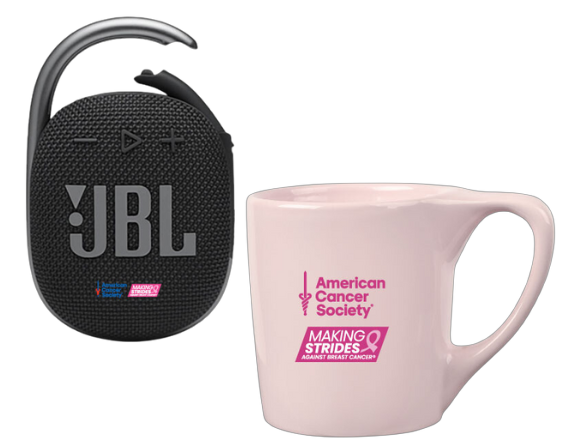
Making Strides Rewards
The ACS Rewards program is our way of thanking you for your creativity and passion! Earn points for every dollar raised and you can redeem those points for Making Strides products and swag.
Strides Rewards

I guess I have always expected that one day I would have breast cancer. My family history with the disease is extensive. My mother had it, 2 of her 3 sisters have had it, her cousin had it. My mother’s mother (my grandmother) had it. Really, the question in my family is who has NOT had it? That’s a pretty short list. It has always lived in the back of my mind, since I was a little kid wondering why my grandma looked weird. It was because she didn’t wear her prosthetic bra unless she was going out.
My own struggle started while I was still a teenager and discovered a lump. This was before my mom or aunts had been diagnosed with breast cancer, but I knew that my grandmother had it, so cancer was the first thing to come to my mind. I was terrified. Fortunately, it was a benign tumor. While at the time it was harmless, my doctor recommended having it removed anyways, since it could turn cancerous in the future. I underwent my first breast surgery at 17 years old.
Fast forward to the fall of 2019. I began to have pain in my right breast. It was a sharp pain. The kind of pain that would wake me up at night. At first, I just brushed it off, thinking I must have pulled a muscle or something. But after a week or two, it wasn’t going away or getting any better. Given my family’s history, I couldn’t ignore it. I made an appointment with my OB/GYN. After a physical exam, she couldn’t feel anything to explain the pain. She ordered an ultrasound and my first mammogram. She explained that the mammogram was only to get a baseline while I was young and healthy, to compare to as I got older. At 36, I was close enough to the age that they would want to start monitoring me, given my family’s history.
I scheduled the ultrasound and the mammogram on the same day. After the ultrasound, the doctor was unable to find any explanation for my pain. He said that pain was not affiliated at all with breast cancer, and explained that I may have pulled a muscle, but sometimes breast pain is just ambiguous. At that point, he tried to send me on my way. I told him that I also had an order for a mammogram. Between my age and the ultrasound results, he assured me it wasn’t cancer, and said that a mammogram wasn’t necessary. I told him that I had the order, and I would feel more comfortable getting the mammogram. Since I was already there and had the appointment scheduled, he just shrugged and said okay.
At this point, the mammogram was just for routine screening. I felt like they rushed me through it, but I had never had one before, so I figured it was because I didn’t know what to expect. I was still in the car driving home when they called. They had found abnormalities and wanted me to come back, if I still had time, so they could do some high-resolution images. They explained that the abnormalities they saw were generally nothing to worry about, especially in younger women. But sometimes it could be indicative of early cancer. The high-resolution mammogram came back inconclusive. Again, I was reassured that it was nothing to really worry about, because I was too young for breast cancer. But they wanted to do a biopsy, just to rule it out for sure. I got the biopsy done a couple weeks later. I tried not worry. After all, multiple doctors had seen me at this point, and none of them seemed concerned that this was cancer.
I got the call the day before Thanksgiving. A day I will never forget. My kids didn’t have school, so my husband was packing them up in the car to bring them to a friend’s house to play. I was in the hallway upstairs when I answered the phone, fully expecting a clean bill of health. It wasn’t though. The doctor tried to be polite and avoided using the word “cancer.” By the time I understood what he was trying to tell me, I managed to make it to the front door to flag my husband down, who was already backing down the driveway. He looked confused, but knew without words what it was, when he walked back into the house to find me crumpled at the bottom of the stairs crying, the doctor still trying to explain the details over the phone. My young daughters witnessed the whole thing.
The next few weeks were a blur. Dark clouds hovered over the holiday season as I saw more doctors, had more tests, and had big decisions to make. I knew right away that I wanted to get a full double mastectomy. They could have done a lumpectomy, to only remove the part where they knew the cancer was. It was only on one side, but I was most definitely not going through this ordeal twice. I found out one of my aunts went through very similar circumstances. They initially found cancer on only one side. She had a double mastectomy, and afterwards they found cancer on both sides. Another aunt only had a lumpectomy. Her cancer returned later on down the road, forcing her to have a double mastectomy anyways. The experiences of my aunts reinforced my decision. I also opted to have DIEP flap reconstruction surgery. This is an alternative to breast implants, where they remove tissue from the abdomen to use to reconstruct the breasts. It is a lengthier and more intensive surgery but yields a more natural looking result. And a fancy new waistline!
I had surgery on January 31st, 2020. I was on the table for almost 14 hours, with 3 different surgeons. I had my oncologist and 2 plastic surgeons working on me simultaneously. I was hospitalized for 3 days afterwards to monitor for complications. The recovery was brutal. My husband took the time off work, and my mom came from Wisconsin to help take care of my daughters, who were only 4 and 8 years old. You expect the pain and immobility, but like parenthood, you have no idea what it’s actually like until it happens. I recall it seeming like an impossible feat just to walk from my bedroom to the end of the hall. Or to stand up straight without feeling like my insides weren’t being ripped out of me. Despite how terrible I felt, I had something to celebrate! They caught the cancer early, before it was able to spread to other parts of my body. This meant no radiation, no chemotherapy, no cancer drugs. However, they found significantly more cancer than they had anticipated. The pathologist found cancer in 7 out of 10 random samples, as well as a small cancerous tumor. This made me even more thankful that I opted for the double mastectomy. A lumpectomy would have never gotten all the cancer out.
Then, while I was still on medical leave, COVID shut the world down. I developed an infection, along with a high fever. COVID was still brand new and scary, to the point that the hospital was reluctant to let me in because of the fever. I had to get cut open again to deal with the infection, which extended my leave from work. While COVID was detrimental to our society, it came as a blessing in disguise during my recovery. My kids were home from school, ballet and Girl Scouts and swimming lessons were cancelled. It lessened the strain as I eased back into a much slower day to day life. I already worked from home, so it was not a huge adjustment for me when it came time to go back to work.
The first anniversary hit me hard. Things moved so fast when I first received my diagnosis that I didn’t have time to process it mentally or emotionally. That first anniversary forced me to face it. Part of it was survivor’s guilt. While having cancer is terrible, I am also incredibly lucky. I am lucky to have caught it so early, before it threatened my life. I was lucky to escape chemotherapy and save my hair! I am lucky to have had this disease young, as that surgery would have been so much harder in my 50’s or 60’s when most women get it. I was lucky to have surgery before COVID, or else I could have had the surgery required to save my life, but the pandemic would refuse any reconstruction until much later. I am lucky that breast cancer is behind me, and my chances of relapse are absolutely minimal. I am lucky for so many things that many women with breast cancer don’t get. So many women have a much harder fight than I did. Some women lose the fight. It’s hard to wrap my head around what could have happened. What would have happened if I hadn’t listened to my body. What would have happened if I hadn’t pushed that doctor for a mammogram who told me I was too young for breast cancer. Throughout all of this, I learned an interesting statistic about breast cancer. Of all women with breast cancer, only 2% are under the age of 40 at the time of diagnosis. I am part of that 2%. No wonder the doctors weren’t concerned and thought I was too young.
I have now passed my fourth anniversary as a breast cancer survivor. I’ve had 2 additional surgeries to smooth things out. While the scars are here to stay, I finally feel satisfied with the results and hope the surgeries are over with. To this day I have no explanation for the pain that started this. Call it my body’s way of telling me something isn’t right, call it divine intervention, but thank God I hurt my boob! If you have made it to the end of my long story, I hope you have learned three important lessons.
1. Listen to your body. Don’t ignore what it’s trying to tell you.
2. Advocate for yourself! If you don’t do it, nobody will.
3. No excuses, just get the mammogram! It saved my life, and it could save yours too.
raised of goal
days left
How much would you like to donate?
How would you like to pay?
Team:Enclara Herd - Washington DC
Company: Enclara Pharmacia
I guess I have always expected that one day I would have breast cancer. My family history with the disease is extensive. My mother had it, 2 of her 3 sisters have had it, her cousin had it. My mother’s mother (my grandmother) had it. Really, the question in my family is who has NOT had it? That’s a pretty short list. It has always lived in the back of my mind, since I was a little kid wondering why my grandma looked weird. It was because she didn’t wear her prosthetic bra unless she was going out.
My own struggle started while I was still a teenager and discovered a lump. This was before my mom or aunts had been diagnosed with breast cancer, but I knew that my grandmother had it, so cancer was the first thing to come to my mind. I was terrified. Fortunately, it was a benign tumor. While at the time it was harmless, my doctor recommended having it removed anyways, since it could turn cancerous in the future. I underwent my first breast surgery at 17 years old.
Fast forward to the fall of 2019. I began to have pain in my right breast. It was a sharp pain. The kind of pain that would wake me up at night. At first, I just brushed it off, thinking I must have pulled a muscle or something. But after a week or two, it wasn’t going away or getting any better. Given my family’s history, I couldn’t ignore it. I made an appointment with my OB/GYN. After a physical exam, she couldn’t feel anything to explain the pain. She ordered an ultrasound and my first mammogram. She explained that the mammogram was only to get a baseline while I was young and healthy, to compare to as I got older. At 36, I was close enough to the age that they would want to start monitoring me, given my family’s history.
I scheduled the ultrasound and the mammogram on the same day. After the ultrasound, the doctor was unable to find any explanation for my pain. He said that pain was not affiliated at all with breast cancer, and explained that I may have pulled a muscle, but sometimes breast pain is just ambiguous. At that point, he tried to send me on my way. I told him that I also had an order for a mammogram. Between my age and the ultrasound results, he assured me it wasn’t cancer, and said that a mammogram wasn’t necessary. I told him that I had the order, and I would feel more comfortable getting the mammogram. Since I was already there and had the appointment scheduled, he just shrugged and said okay.
At this point, the mammogram was just for routine screening. I felt like they rushed me through it, but I had never had one before, so I figured it was because I didn’t know what to expect. I was still in the car driving home when they called. They had found abnormalities and wanted me to come back, if I still had time, so they could do some high-resolution images. They explained that the abnormalities they saw were generally nothing to worry about, especially in younger women. But sometimes it could be indicative of early cancer. The high-resolution mammogram came back inconclusive. Again, I was reassured that it was nothing to really worry about, because I was too young for breast cancer. But they wanted to do a biopsy, just to rule it out for sure. I got the biopsy done a couple weeks later. I tried not worry. After all, multiple doctors had seen me at this point, and none of them seemed concerned that this was cancer.
I got the call the day before Thanksgiving. A day I will never forget. My kids didn’t have school, so my husband was packing them up in the car to bring them to a friend’s house to play. I was in the hallway upstairs when I answered the phone, fully expecting a clean bill of health. It wasn’t though. The doctor tried to be polite and avoided using the word “cancer.” By the time I understood what he was trying to tell me, I managed to make it to the front door to flag my husband down, who was already backing down the driveway. He looked confused, but knew without words what it was, when he walked back into the house to find me crumpled at the bottom of the stairs crying, the doctor still trying to explain the details over the phone. My young daughters witnessed the whole thing.
The next few weeks were a blur. Dark clouds hovered over the holiday season as I saw more doctors, had more tests, and had big decisions to make. I knew right away that I wanted to get a full double mastectomy. They could have done a lumpectomy, to only remove the part where they knew the cancer was. It was only on one side, but I was most definitely not going through this ordeal twice. I found out one of my aunts went through very similar circumstances. They initially found cancer on only one side. She had a double mastectomy, and afterwards they found cancer on both sides. Another aunt only had a lumpectomy. Her cancer returned later on down the road, forcing her to have a double mastectomy anyways. The experiences of my aunts reinforced my decision. I also opted to have DIEP flap reconstruction surgery. This is an alternative to breast implants, where they remove tissue from the abdomen to use to reconstruct the breasts. It is a lengthier and more intensive surgery but yields a more natural looking result. And a fancy new waistline!
I had surgery on January 31st, 2020. I was on the table for almost 14 hours, with 3 different surgeons. I had my oncologist and 2 plastic surgeons working on me simultaneously. I was hospitalized for 3 days afterwards to monitor for complications. The recovery was brutal. My husband took the time off work, and my mom came from Wisconsin to help take care of my daughters, who were only 4 and 8 years old. You expect the pain and immobility, but like parenthood, you have no idea what it’s actually like until it happens. I recall it seeming like an impossible feat just to walk from my bedroom to the end of the hall. Or to stand up straight without feeling like my insides weren’t being ripped out of me. Despite how terrible I felt, I had something to celebrate! They caught the cancer early, before it was able to spread to other parts of my body. This meant no radiation, no chemotherapy, no cancer drugs. However, they found significantly more cancer than they had anticipated. The pathologist found cancer in 7 out of 10 random samples, as well as a small cancerous tumor. This made me even more thankful that I opted for the double mastectomy. A lumpectomy would have never gotten all the cancer out.
Then, while I was still on medical leave, COVID shut the world down. I developed an infection, along with a high fever. COVID was still brand new and scary, to the point that the hospital was reluctant to let me in because of the fever. I had to get cut open again to deal with the infection, which extended my leave from work. While COVID was detrimental to our society, it came as a blessing in disguise during my recovery. My kids were home from school, ballet and Girl Scouts and swimming lessons were cancelled. It lessened the strain as I eased back into a much slower day to day life. I already worked from home, so it was not a huge adjustment for me when it came time to go back to work.
The first anniversary hit me hard. Things moved so fast when I first received my diagnosis that I didn’t have time to process it mentally or emotionally. That first anniversary forced me to face it. Part of it was survivor’s guilt. While having cancer is terrible, I am also incredibly lucky. I am lucky to have caught it so early, before it threatened my life. I was lucky to escape chemotherapy and save my hair! I am lucky to have had this disease young, as that surgery would have been so much harder in my 50’s or 60’s when most women get it. I was lucky to have surgery before COVID, or else I could have had the surgery required to save my life, but the pandemic would refuse any reconstruction until much later. I am lucky that breast cancer is behind me, and my chances of relapse are absolutely minimal. I am lucky for so many things that many women with breast cancer don’t get. So many women have a much harder fight than I did. Some women lose the fight. It’s hard to wrap my head around what could have happened. What would have happened if I hadn’t listened to my body. What would have happened if I hadn’t pushed that doctor for a mammogram who told me I was too young for breast cancer. Throughout all of this, I learned an interesting statistic about breast cancer. Of all women with breast cancer, only 2% are under the age of 40 at the time of diagnosis. I am part of that 2%. No wonder the doctors weren’t concerned and thought I was too young.
I have now passed my fourth anniversary as a breast cancer survivor. I’ve had 2 additional surgeries to smooth things out. While the scars are here to stay, I finally feel satisfied with the results and hope the surgeries are over with. To this day I have no explanation for the pain that started this. Call it my body’s way of telling me something isn’t right, call it divine intervention, but thank God I hurt my boob! If you have made it to the end of my long story, I hope you have learned three important lessons.
1. Listen to your body. Don’t ignore what it’s trying to tell you.
2. Advocate for yourself! If you don’t do it, nobody will.
3. No excuses, just get the mammogram! It saved my life, and it could save yours too.
Your support allows the American Cancer Society to continue:
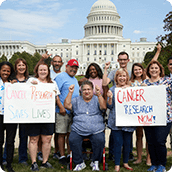

Fighting breast cancer in city halls, statehouses, and Congress by elevating the patient voice to advance policy change through the American Cancer Society Cancer Action Network (ACS CAN)
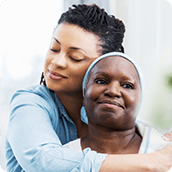
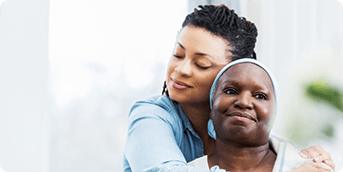
Ensuring no one feels alone at any point on their breast cancer journey, from prevention to survivorship, and, for some, the end of life.
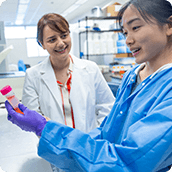

Investing in breakthrough science to find more - and better - treatments, uncover factors that may cause breast cancer, and improve patients' quality of life.
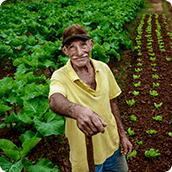

Ensuring that all people have a fair and just opportunity to prevent, find, treat, and survive breast cancer. ACS and ACS CAN believe all people should have a fair and just opportunity to live a longer, healthier life free from cancer regardless of how much money they make, the color of their skin, their sexual orientation, gender identity, their disability status, or where they live.
Thank you for fueling the American Cancer Society's fight against breast cancer.
Many thanks to our generous sponsors for fueling the American Cancer Society's fight against breast cancer.
Making Strides Rewards
The ACS Rewards program is our way of thanking you for your creativity and passion! Earn points for every dollar raised and you can redeem those points for Making Strides products and swag.
Strides RewardsThis isn’t what I wanted.
Welcome to our Team Page. We've formed a team because this cause is important to us. We want to help. And walking and raising money in our local American Cancer Society Making Strides Against Breast Cancer event is the best way we can do that. We all have different reasons for participating but we share a determination to help save lives from breast cancer.
There are so many ways that the money our team raises helps. It’s helping fund innovative research. It's providing free information for people dealing with the disease. It’s providing rides to treatment and places to stay for people who have to seek treatment far from home. In short, our money is helping save lives. Consider donating to our team and helping advance the cause.
How We Support the American Cancer Society
Of course we walk in the Making Strides Against Breast Cancer event. And we solicit donations from family, friends, and other supporters. But we also schedule fundraisers in lead-up to the big event. Bake-sales, car washes, and countless other types of events. And we promote those on social media, through Facebook and Twitter, by word of mouth, and through flyers at work and around the neighborhood. The success of fundraising events depends on two things - hard work and getting the word out. And we're out to do both. Keep an eye out for our fundraising events.
Join us. Donate today. Or walk with us.